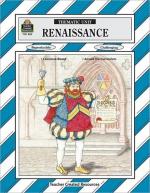|
This section contains 2,161 words (approx. 8 pages at 300 words per page) |

|
Sarpi. By 1560 Catholics and Protestants alike had rejected the nondogmatic, tolerant approach to religious belief exemplified by Desiderius Erasmus. His thought continued to influence the few thinkers who sought to remain apart from the religious debates and violence, but the religious issues were so pervasive that it was almost impossible to remain above the fray. The late sixteenth century was not a productive era for secular thought. In Italy, Pope Julius III was the last active papal patron of humanists; most of his successors were openly hostile to humanism. In Venice, however, there was a late flowering of humanism made possible in large part because of the city's determination to remain free of papal domination. The greatest name among the Venetian intellectuals of the late sixteenth century was Pietro Paulo Sarpi. He was a priest and a theologian who also mastered mathematics and...
|
This section contains 2,161 words (approx. 8 pages at 300 words per page) |

|




